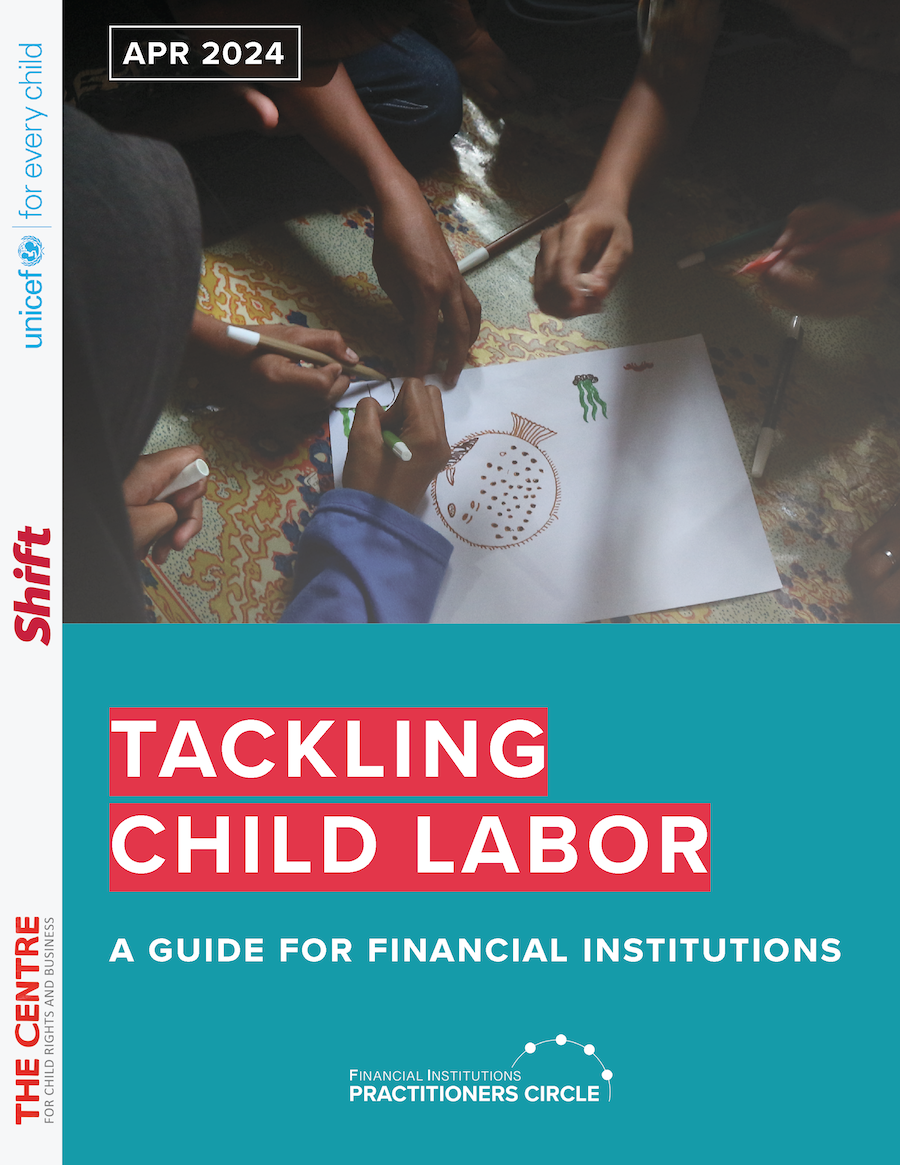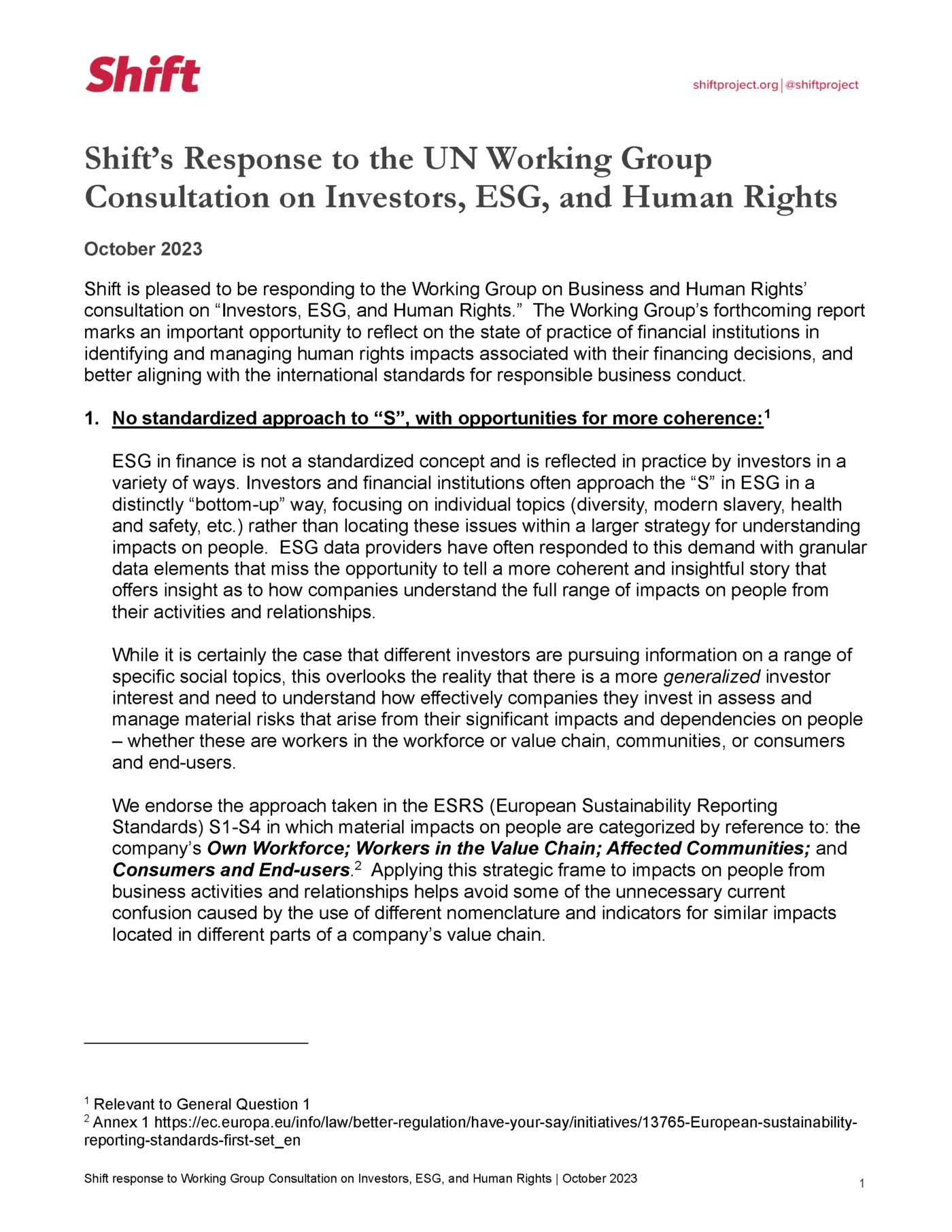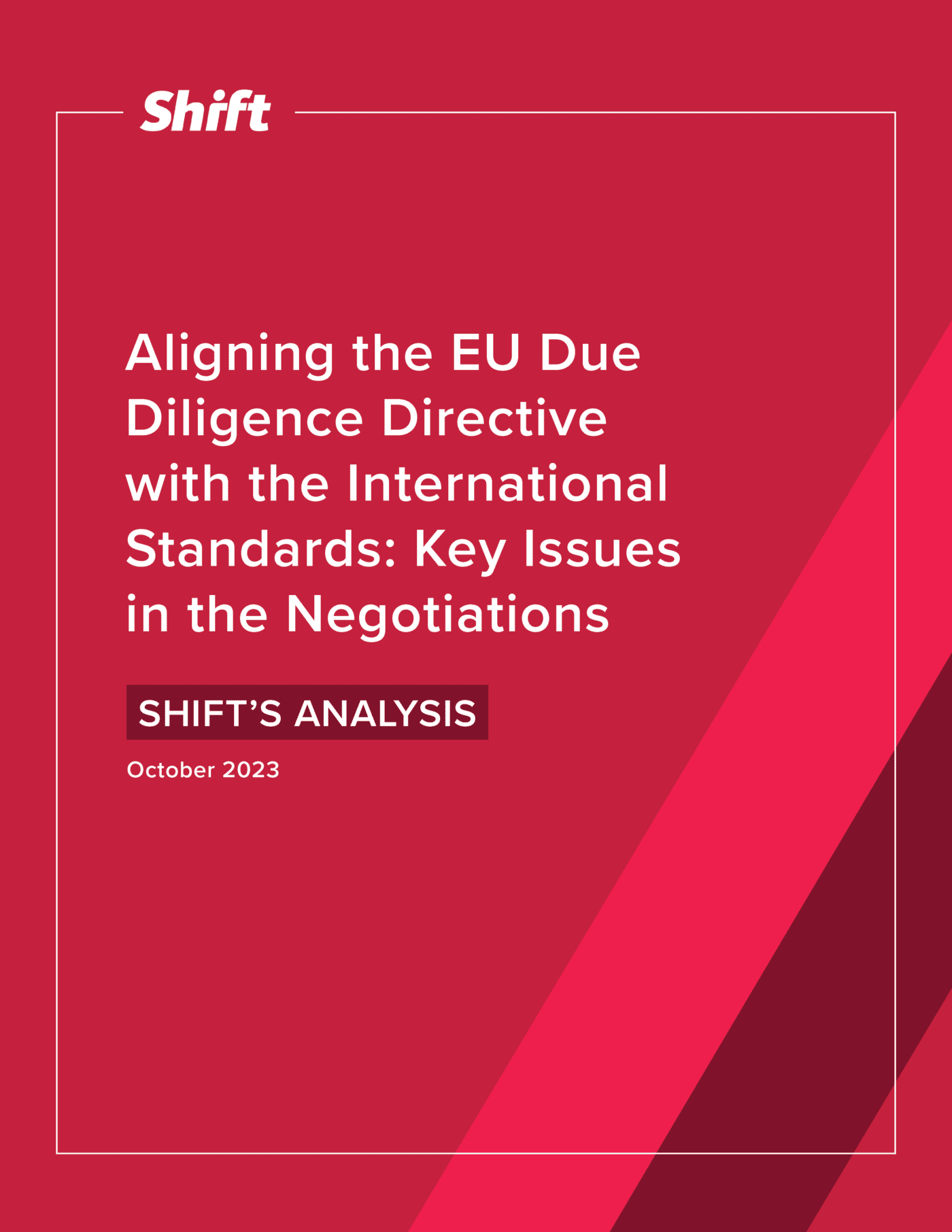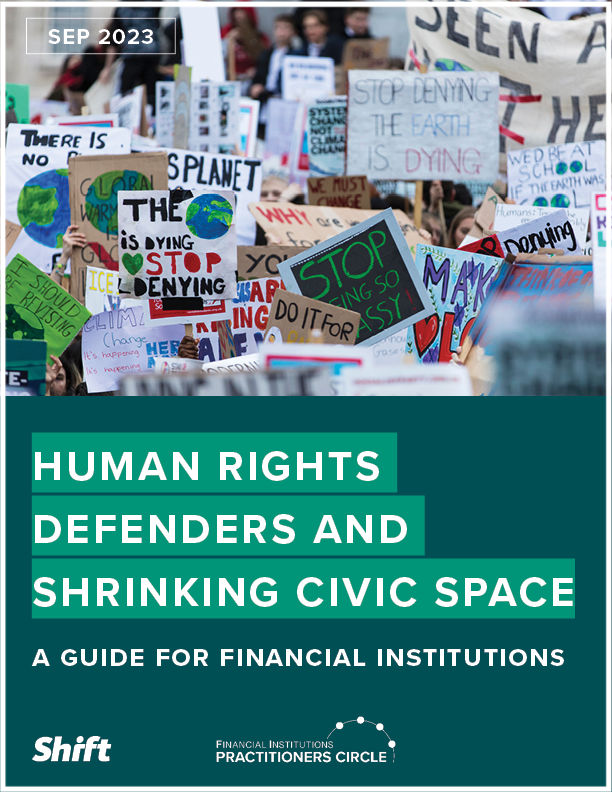A little over five years ago, we were sitting in a room at the United Nations in Geneva, eagerly awaiting the endorsement of a groundbreaking standard on business respect for human rights. On June 16, 2011, the UN Human Rights Council unanimously gave that endorsement to the UN Guiding Principles on Business and Human Rights.
By mid-July, we had established Shift, with our mission to put the Guiding Principles into practice.
Five years later, significant progress on business respect for human rights has been made, thanks to the tireless work of the entire community of business and human rights practitioners, supporters and advocates. But we still have a long way to go.
On our fifth anniversary as an organization, we offer here five reflections that give us confidence that progress is real and accelerating – and five reflections on issues that remain a brake on the pace of change that is needed.
Five Reflections on Meaningful Progress
1. Reaching far beyond the usual crowd
Five years ago, companies active in the business and human rights debate were mostly large Western extractives, brands and retailers. Today, the conversation has moved far beyond those groups and into business to business relationships. This dynamic has advanced far and fast due to a mix of regulatory developments that are driving human rights due diligence through global supply chains, such as the US federal government procurement requirements on trafficking and the UK Modern Slavery Act, company efforts such as those driven by the Global Business Initiative on Human Rights, and NGO and trade union campaigns on abuses in companies’ operations in a wide range of contexts.
Moreover different kinds of “enterprises” are understanding that the Guiding Principles speak to them as well. Institutional investors are recognizing that they themselves are exposed where they invest in companies that have severe human rights impacts. Our recent work with John Ruggie to develop recommendations for embedding respect for human rights at FIFA shows the relevance of this agenda for major sports organizations too. We hope to see that trend grow further through the work of the Institute for Human Rights and Business on mega-sporting events.
2. Meaningful communication instead of PR
Meaningful communication is a real driver for improved management of human rights issues — leading to a positive change in people’s lives.
With most people around the world easily able to share news and information, corporate impacts on people’s rights can hardly be kept a secret. Few people are convinced by company reports that avoid these challenges, suggest they are neatly resolved, or offer the number of people trained or audits conducted as a sign that it’s all under control.
We now have a growing cadre of companies – the likes of Unilever, Nestlé, H&M, Newmont, Marks & Spencer, Ericsson and Microsoft – offering far more meaningful insights into their human rights challenges, processes, outcomes and forward plans. We are proud at Shift to have worked with Mazars to develop the UN Guiding Principles Reporting Framework that is driving this new trend with the support of a large coalition of investors. This kind of meaningful communication sets the scene for more valuable discussions with all stakeholders — and it is also a real driver for improved management of human rights issues, leading to a positive change in people’s lives.
3. Follow the money: driving change through public finance
When those with the money ask questions, companies pay attention.
Public financial institutions, like national development finance institutions and export credit agencies, can play a critical role in helping to set expectations for many other industry sectors. Their practices enhance or undermine states’ implementation of their own duty to protect human rights.
For over two decades, many have sought to address environmental and social risks through the adoption of risk management approaches based on the International Finance Corporation’s Performance Standards. But leading public financial institutions are now asking whether these existing approaches are sufficient, and how they might need to evolve to meet the expectations of human rights due diligence. This shift in focus is likely to increase as a result of the 2016 revision of the OECD “Common Approaches,” which introduce new human rights expectations that apply to export credit agencies in all OECD countries.
When those with the money ask questions, companies pay attention.
Through our work with organizations like Norway’s export credit agency, the UK’s development finance institution and Peru’s independent banking regulator, we’ve explored what public financial institutions can do to strengthen their own approaches. And we’re excited about the leadership role that these institutions can play in driving broader conversations among their peers.
4. Delivering wise legal counsel
Whether as in-house counsel inside major corporations, or as external advisors in large law firms, lawyers have the potential to significantly hinder, or to advance, companies’ efforts to respect human rights. We are proud of the leadership of our own General Counsel John Sherman in chairing a working group of the International Bar Association that developed groundbreaking guidance for business lawyers globally on what the Guiding Principles mean for their practice. The guidance recognizes the distinct and special responsibilities that lawyers have to their clients, and helps them explore some of the challenges that may arise.
With the unanimous endorsement of the guidance by the IBA in June 2016, the question of whether or not corporate lawyers have a role to play in implementing the Guiding Principles has been laid firmly to rest. We can now all get on with exploring what this actually looks like in practice.
With the unanimous endorsement of the guidance by the IBA in June 2016, the question of whether or not corporate lawyers have a role to play in implementing the Guiding Principles has been laid firmly to rest. We can now all get on with exploring what this actually looks like in practice.
5. New ways of working together
It has become a cliché to say that companies cannot address systemic human rights challenges alone. The need for collective action has been recognized for some time. These initiatives, whether within industries or in multistakeholder settings, can no longer just be a means to share practice or – worse still – to hide in the pack. So we welcome the new dynamic towards impactful action around specific (yet big) challenges. Take the Bangladesh Accord tackling building safety in that country, or the ACT initiative to see how industry-wide collective bargaining can advance living wages in the apparel sector.
These are targeted initiatives with a clear ambition that recognizes the critical role of trade unions as a partner in advancing solutions. The commitment of the Consumer Goods Forum to take on forced labor should be another such example, matching their environmental commitment to “zero net deforestation” by 2020. A focus on specific outcomes around big challenges with a defined scope and the right partners, and based on clear commitments and accountability, is the new expectation for collective action. | See an example of how Shift is supporting the Dutch government in facilitating collaborative dialogue on human rights risks
Five Areas Urgently Needing More Progress
1. Putting the action into National Action Plans
Government commitments to develop National Action Plans on business and human rights (NAPs) to implement the Guiding Principles have been far too slow to materialize. Over 25 NAPs (and substantially more by some counts) are in the works, which is potentially good news. Processes with strong civil society contribution, such as that coordinated by Poder in Mexico, or with leadership and expertise from the National Human Rights Institution, such as provided by SUHAKAM in Malaysia, offer particular hope.
But inevitably each state that develops a NAP will look to those that went before. And of those already on the table, there are few that live up to the billing of their own titles. A National Action Plan must first and foremost be about future plans for action, not descriptions of legislation or recaps of past action. Governments that see this process as a tiresome necessity will entirely miss the opportunity that the Guiding Principles provide them with to engage with both business and with civil society on initiatives that can address not just business and human rights but also poverty, income inequality, social justice and sustainable development. | Learn more about Shift’s contributions to NAP processes in Germany, the UK and the US
2. Moving remedy beyond the rhetoric
The third pillar of the Guiding Principles, access to effective remedy, is sometimes described as the “forgotten pillar.” At Shift, we don’t see it as forgotten, nor inherently weak, but as uncomfortable and hard to talk about.
That’s in part why we haven’t yet seen any National Action Plan on business and human rights meaningfully address judicial remedy, despite this being one aspect of the Guiding Principles that depends entirely on states for its effective implementation. It’s also why discussions among companies often get bogged down in concerns about exposure to liability rather than realizing the critical early warning role that effective grievance mechanisms can play. Surely it’s much better to know about human rights problems before they become liabilities?
Surely it’s much better to know about human rights problems before they become liabilities?
In terms of progress on access to judicial remedy, we were encouraged like many others to see the Council of Europe’s recommendations on this topic in early 2016. And we were pleased to help facilitate government workshops as part of the Office of the High Commission for Human Rights’ (OHCHR) work on improving accountability and access to judicial remedy. Their work was welcomed by the UN Human Rights Council in June and culminated in guidance for states. So now we have states committing themselves to take action on judicial remedy and guidance on how they can do so – two key ingredients for urgently needed progress in this area.
3. Changing the discourse on human rights and development
The Sustainable Development Goals (SDGs) were adopted by the United Nations last year. These 17 goals aim to end poverty, fight inequality and injustice, and tackle climate change by 2030. They include the need to end hunger and promote sustainable agriculture, to achieve gender equality and promote decent work for all.
Advancing human rights is critical to achieving most of the goals, as illustrated so well by the Danish Institute for Human Rights. And respect for human rights should sit at the heart of any company’s strategy for how it will contribute to the SDGs.
Respect is positive, it is transformative, it is essential. It is the hallmark of a lasting and future-ready, competitive company.
Yet there is a risk that companies see the Guiding Principles as just a “do no harm” standard, a matter of compliance, or “the starting point” en route to more exciting and innovative ideas for how they can support the SDGs. This overlooks the SDGs’ potential to drive positive change for hundreds of millions of the poorest and most marginalized people.
When a company drives diversity and inclusion through its workplaces, it not only reduces risks of discrimination but can open opportunities for women, minorities and others and help change attitudes in society. When a company collaborates with others to push forced labor or poverty wages out of its supply chain, it both reduces risks of abuses and helps workers around the world begin to build lives with dignity and opportunity for themselves and their families. When a company builds a new dam or digs a mine following meaningful dialogue with communities to gain their consent, it protects people from dispossession and empowers them to expect a say in decisions that affect their basic welfare.
In short, there is no more pressing, nor more powerful, way for companies to contribute to the SDGs than to advance respect for human rights across their value chains. Respect for human rights is not “just” an exercise in compliance or risk management. It is positive, it is transformative, it is essential. It is the hallmark of a lasting and future-ready, competitive company.
4. Standing up for human rights is not a crime
It is impossible to reflect on the issues that need urgent action without acknowledging the murder this year of Berta Cáceres as well as the violent deaths of other leaders of her organization COPINH, and the extreme risks that many other human rights defenders like them face on a daily basis. Whether standing up to companies or to states, their bravery is extraordinary.
The Guiding Principles place potentially affected stakeholders, including human rights defenders, in a central role — their perspectives are at the heart of human rights due diligence. If they are afraid of raising concerns, if they face threats for simply naming hard facts, then the fundamental premise of human rights due diligence starts to break down.
The International Corporate Accountability Roundtable, together with the International Service for Human Rights, have developed practical guidance for states on how to meaningfully involve human rights defenders and address threats to them as part of National Action Plan processes. And the Coalition for Human Rights in Development has been drawing development finance institutions’ attention to the urgency of this issue.
Persecution of human rights defenders should deeply concern all of us who want to see the Guiding Principles fulfill their promise.
5. Ending hypocrisy: say what you mean, do what you say
Respecting human rights isn’t something a company does in just one part of its business and it is not something that can be given to one department to “fix” and then ignored. If a company is serious about meeting its responsibility under the Guiding Principles, it needs to take a tough look across all parts of its business, including those that are integrally connected to its organizational strategy. Two that require particular scrutiny are taxation arrangements and government lobbying activities.
When companies pursue offshore tax structures and other means designed to avoid paying appropriate taxes where they earn their profits, they cut into the revenues governments need to meet their own obligations to respect, protect and fulfill people’s human rights. Too often those same companies will bemoan that governments do not play their part in implementing their own labor and environmental laws, oblivious to the irony of what they’re saying. Similarly, when companies lobby – directly or through third parties – against improved labor standards, higher minimum wages or greater consultation rights for communities, they both fail in their own responsibilities and undermine the role of the state.
These will be crucial next frontiers on the road to more fully putting business respect for human rights into practice.
Rachel Davis and Caroline Rees are the co-founders of Shift and leading experts on how companies can implement the UN Guiding Principles on Business and Human Rights.



